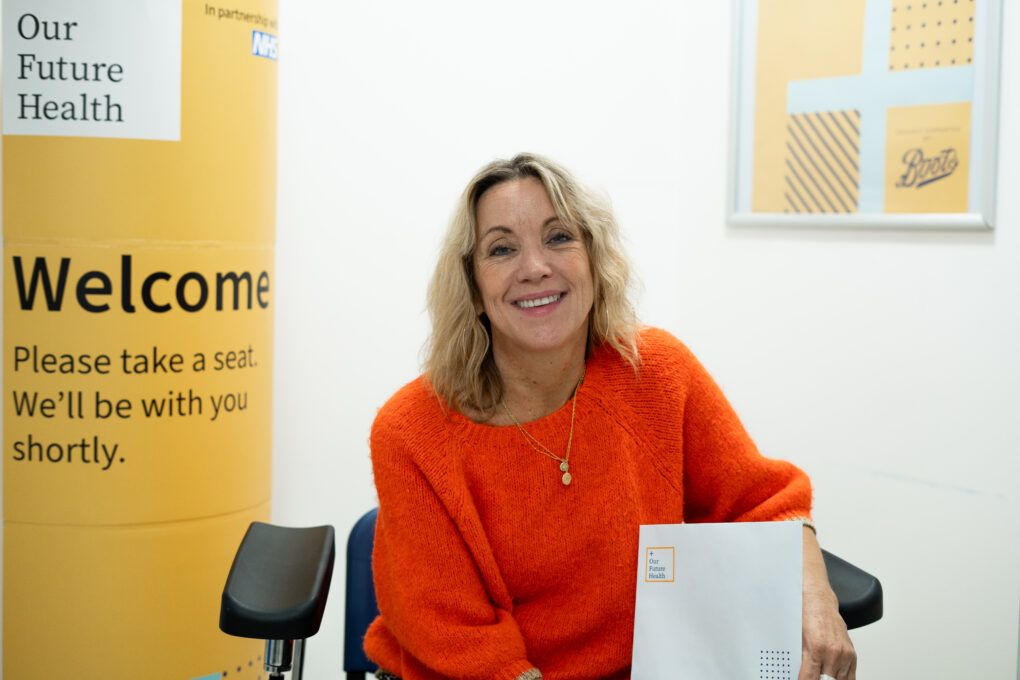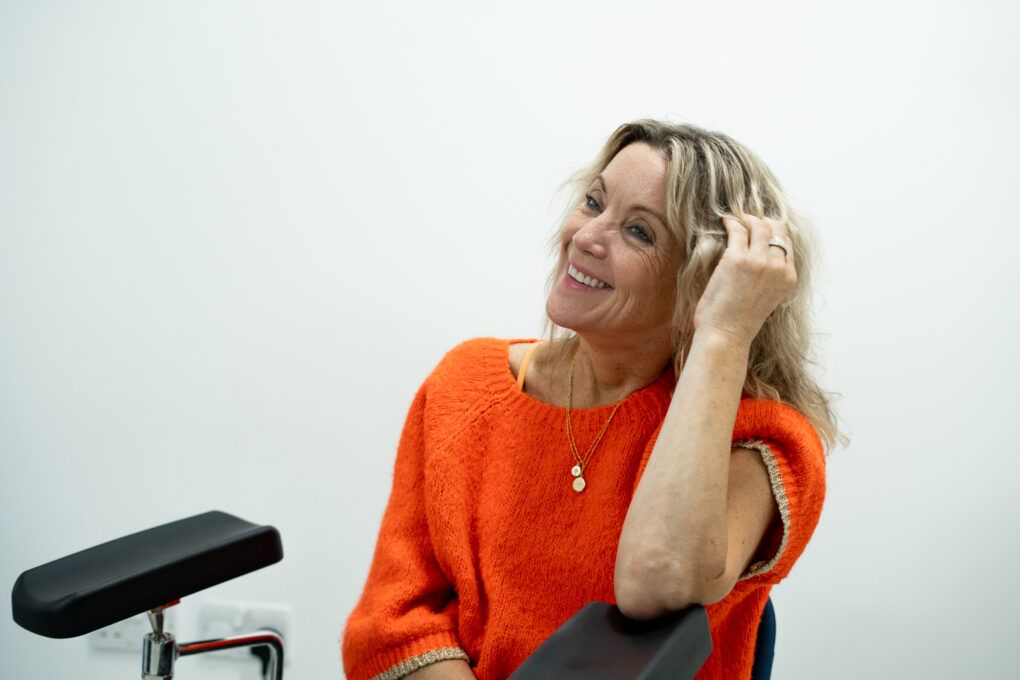‘I’m signing up to Our Future Health because I want everyone with cancer to have the chance to live’

Survivorship. That’s the word the oncologist used at my most recent hospital appointment. Because for more than ten years, I’ve been living – surviving – with secondary breast cancer.
The oncologist introduced herself then said, “I was just reading your notes, what an incredible story”. We talked about the treatment I’ve been on for five and a half years, that’s targeted to my specific kind of cancer. We touched on the side effects and why the team will have to monitor the drug’s toxicity in the long term, regardless of how well it’s working against the cancer.
“We have to look at survivorship, how you manage the disease and treatment in the long term,” she said. Technically, a secondary diagnosis means the cancer has moved beyond the site of its original tumour. Practically, it means I’m likely to be on treatment for life.
She added that new treatment lines like the one I’m on have increased long-term survival, and that this is changing the way that medics manage the disease.
I know I’m not alone when I say that I’d dearly love ‘survivorship’ to be the word that everyone who has cancer hears from their oncologist. I know my long-term survival is a privilege, although not a rubber-stamped guarantee against what people fear the most. My fervent wish is that in the years to come, the long periods of remission and good health that I’m so fortunate to be experiencing will become the norm for everyone who has cancer.
That’s why I’ve just signed up for Our Future Health in the Piccadilly branch of Boots in London, giving 20 minutes of my time, a vial of my blood and information about my life for what I consider one of the best causes: research.
At times it can be difficult to process being ‘one of the lucky ones’ because with that label comes a sense of guilt. Why me? So, I pay my good fortune forward in whatever ways I can, whether it’s running a marathon to raise money for a cancer charity, sharing my story in front of an audience, or signing up for Our Future Health.
The best kind of payback
By volunteering, I feel I’m paying back for the incredible treatment I’ve had.
When I was first diagnosed with primary breast cancer back in June 2010, I was a 39-year-old newly single mother to baby triplets and a seven-year-old boy. After I found that first 5cm lump in my right breast, I had chemotherapy to shrink the tumour, followed by a mastectomy, lymph node removal, reconstruction, radiotherapy and hormone treatment. Despite the obvious challenges, I did well physically. By the end of the year, I was fortunate to be told I was cancer free and in remission.
Life moved on, my hair grew back, and my strength returned – but the emotional impact of the diagnosis felt crippling. I struggled to cope. I found it hard to be present with my kids, almost scared to love them fully because my fear of leaving them was so great.
At the end of 2014, aged 43, my beautiful triplets turned five and my eldest son was eleven. Just as I’d begun to embrace a cancer-free future and trust that I would be here to see my kids grow and blossom, I was told the cancer was back, this time in my skin. It didn’t look how you’d normally think of skin cancer, a melanoma. Rather it was a hot, red, itchy rash that started as a little patch and, over a period of weeks, spread all over my chest.
Reeling from this stage four, secondary diagnosis, I became convinced that I was going to die.
Again, I was fortunate. I responded quickly to a different chemotherapy, and the rash disappeared during the first few weeks of treatments. When chemotherapy works it’s phenomenal. After that treatment, I went back into remission. But as a secondary breast cancer patient, I now knew I’d remain on treatment for life.
Being a mum was my biggest goal and focus but I felt crippled with anxiety and found it impossible to embrace life fully. I began to connect with others from the online cancer community and saw how all of us were better able to cope together and could get so much from sharing and talking and supporting each other.
Fast forward to the beginning of 2019, and suddenly I was faced with cancer diagnosis number three, this time grade 3 tumours in my left breast. At the same time, I was told I had a tumour in my lung too. I had surgery and, thank goodness, that one turned out to be benign. Miraculously, yet again, a mastectomy and chemotherapy worked to treat the breast cancer – and appears still to be working.
My oldest son is now 21, the triplets are heading towards GCSEs and against the odds, I’m still here.

United we stand
The cancer community that I belong to is rich with love, understanding and connection. But it’s also steeped in loss, grief and fear. I’ve lost many friends, a lot of them a decade or so younger than me. I think of them often. There are several more currently in the front of my mind, who’ve told me they’re preparing for a heartbreakingly premature end.
It’s not lost on me that in the weeks before she died, the beautiful, shining, smiling face of my good friend Dame Deborah James appeared on the huge billboard overlooking Piccadilly Circus – above the very brand of Boots where I signed up for Our Future Health. A coincidence? Probably. But I like to see it as a sign that I’m doing the right thing, making a difference in a tiny way.
Debs and so many incredible, vital, bright and vibrant people are no longer with us. It’s devastating and unfair. And so, what do we do? We honour their legacy in the best possible way, by appreciating and embracing our own precious lives and health. And, at the same time, we do whatever we can to ensure that the future will be different for those facing cancer.
We have so much hope. Researchers are drilling down into cancer, revealing that it’s not just one disease, but many. They’re developing effective drugs for each specific type of the disease. Our Future Health will accelerate this progress. This programme will allow researchers to look deeply into the genetics and lifestyle risks associated with cancer. It will lead to better diagnosis and personalised treatment – even prevention of the disease altogether.
‘Everyone deserves to be as lucky as me’
When one of the triplets, Ella, was just 12 she overheard me talking about a friend who was also ill. She looked puzzled and said, ‘Is she going to die? I didn’t think people died from cancer.’ Such an innocent, because what she knew about cancer was what was happening to me, a lucky person living with survivorship.
I’m signing up for Our Future Health because everyone deserves to be a lucky survivor, and this is our best chance of that.
Emma is author of All That Followed: A story of cancer, kids and the fear of leaving too soon. She’s the host of the podcast, ‘Open with Emma Campbell’. On Instagram, she’s @limitless_em

Let’s prevent disease together
By volunteering for Our Future Health, you can help health researchers discover new ways to prevent, detect and treat common conditions such as diabetes, cancer, heart disease, stroke and Alzheimer’s.